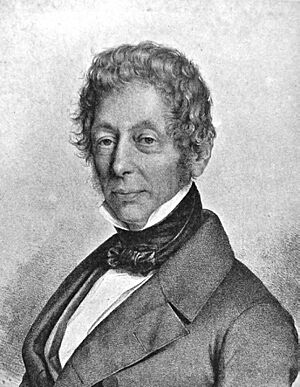Carsten Hauch facts for kids
Johannes Carsten Hauch (born May 12, 1790 – died March 4, 1872) was a famous Danish poet. He also wrote plays and novels.
Contents
Early Life and Education
Johannes Carsten Hauch was born in Frederikshald, Norway. His father, Frederik Hauch, was a Danish official called a bailiff. His mother, Karen Tank, was the sister of a well-known Norwegian merchant.
When Hauch was 12, his mother passed away. He and his father then moved back to Denmark in 1803. In 1807, when he was 17, Hauch volunteered to fight against an English invasion.
He started studying at the University of Copenhagen in 1808. He earned his doctor's degree in 1821. During his studies, he became friends with important thinkers like Steffens and Oehlenschläger. He was very interested in their romantic ideas about poetry and philosophy.
Early Career and Challenges
Hauch's first two plays were The Journey to Ginistan and The Power of Fancy, both released in 1816. He also wrote a lyrical play called Rosaurn in 1817. However, these early works did not become popular.
Feeling discouraged, Hauch decided to focus on science instead of poetry. He earned a doctor's degree in zoology in 1821. He then traveled abroad to continue his scientific studies. While in Nice, he had an accident and had to have one foot removed.
Return to Writing
After his accident, Hauch returned to writing. He published a fairy tale play called The Hamadryad. He also wrote several tragedies, which are serious plays with sad endings. These included Bajazet, Tiberius, and Gregory VII (1828-1829). Other tragedies were The Death of Charles V (1831) and The Siege of Maestricht (1832). Unfortunately, these plays were not well-received by the public.
Hauch then started writing novels. He published five romances:
- Vilhelm Zabern (1834)
- The Alchemist (1836)
- A Polish Family (1839)
- The Isle on the Rhine (1845)
- Robert Fulton (1853)
In 1842, he collected his shorter Poems into a book.
Later Career and Recognition
In 1846, Hauch became a professor of Scandinavian languages at the University of Kiel. However, he returned to Copenhagen in 1848 when a war began. Around this time, his talent for writing plays was at its peak. He wrote many excellent tragedies, including:
- Svend Grathe (1841)
- The Sisters at Kinnekullen (1849)
- Marshal Sag (1850)
- Honour Lost and Won (1851)
- Tycho Brahe's Youth (1852)
From 1858 to 1860, Hauch served as the director of the Danish National Theatre. He continued to write plays, producing three more tragedies:
- The King's Favourite (1859)
- Henry of Navarre (1863)
- Julian the Apostate (1866)
In 1861, he published another collection of Lyrical Poems and Romances. The next year, 1862, he released a historical epic poem called Valdemar Seir.
From 1851 until his death, Hauch held an important position. He was an honorary professor of aesthetics at the University of Copenhagen. He took over this role from his friend Oehlenschläger. Johannes Carsten Hauch passed away in Rome in 1872. He was buried in the Cimitero acattolico.
Legacy
Hauch was one of Denmark's most productive poets. His lyrical poems and romances were always well-written and often very imaginative. In all his works, especially his tragedies, he showed a strong interest in mysterious and supernatural themes.
Many people consider Marshal Stig to be his best play. Among his novels, the patriotic story Vilhelm Zabern is the most admired. His novels were collected and published between 1873 and 1874. His dramatic works were also published in three volumes, with a second edition appearing from 1852 to 1859.
 | Mary Eliza Mahoney |
 | Susie King Taylor |
 | Ida Gray |
 | Eliza Ann Grier |


